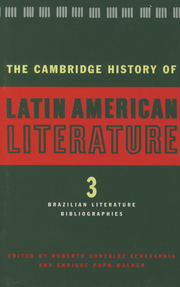Book contents
- Frontmatter
- Introduction to Volume 3
- 1 The literary historiography of Brazil
- 2 Colonial Brazilian literature
- 3 Brazilian poetry from the 1830s to the 1880s
- 4 Brazilian poetry from 1878 to 1902
- 5 The Brazilian theatre up to 1900
- 6 Brazilian fiction from 1800 to 1855
- 7 The Brazilian novel from 1850 to 1900
- 8 Brazilian fiction from 1900 to 1945
- 9 Brazilian prose from 1940 to 1980
- 10 The Brazilian short story
- 11 Brazilian poetry from 1900 to 1922
- 12 Brazilian poetry from Modernism to the 1990s
- 13 The Brazilian theatre in the twentieth century
- 14 Brazilian popular literature (the literatura de cordel)
- 15 Literary criticism in Brazil
- 16 The essay: architects of Brazilian national identity
- 17 The Brazilian and the Spanish American literary traditions: a contrastive view
- Bibliography
- Index
Introduction to Volume 3
Published online by Cambridge University Press: 28 March 2008
- Frontmatter
- Introduction to Volume 3
- 1 The literary historiography of Brazil
- 2 Colonial Brazilian literature
- 3 Brazilian poetry from the 1830s to the 1880s
- 4 Brazilian poetry from 1878 to 1902
- 5 The Brazilian theatre up to 1900
- 6 Brazilian fiction from 1800 to 1855
- 7 The Brazilian novel from 1850 to 1900
- 8 Brazilian fiction from 1900 to 1945
- 9 Brazilian prose from 1940 to 1980
- 10 The Brazilian short story
- 11 Brazilian poetry from 1900 to 1922
- 12 Brazilian poetry from Modernism to the 1990s
- 13 The Brazilian theatre in the twentieth century
- 14 Brazilian popular literature (the literatura de cordel)
- 15 Literary criticism in Brazil
- 16 The essay: architects of Brazilian national identity
- 17 The Brazilian and the Spanish American literary traditions: a contrastive view
- Bibliography
- Index
Summary
Brazil’s is the most independent, and perhaps most original, national literature in the New World. Whereas the United States’ powerful literary tradition is, nevertheless, in some synchrony with that of England, its former metropolis, as is the case with the Spanish American literary tradition with regards to that of Spain, Portugal ceased long ago to be a significant literary presence in Brazil. This is ironic because, of all the American nations, with the exception of Canada, Brazil is the one whose break from the mother country was least painful and radical. Instead of becoming independent from the metropolitan government, the metropolitan government actually moved to Brazil. Brazil absorbed its origins, like some mythological figure who swallows its parents. The emergence of Brazilian literature is, thus, the product of this assimilation.
The foregoing does not mean that modern Portugal is devoid of influential literary figures. Eça de Queiroz, Fernando Pessoa, and currently José Saramago are authors of well deserved world-wide acclaim, who are much respected in Brazil. Yet Brazil itself was able to boast, as early as the nineteenth century, of a writer second to none in the Hispanic world (Spain included, of course); Joaquim Maria Machado de Assis. Machado was the first world-class Latin American writer; he enjoyed a reputation whose only worthy predecessor may have been Sor Juana Inés de la Cruz in colonial Mexico. In the twentieth century, Brazil has generated its own artistic movements, and produced a number of writers of indisputable quality, from Euclides da Cunha, whose Os sertões (1902) [Rebellion in the Backlands] is an influential masterpiece in all of Latin America, to João Guimãraes Rosa, whose Grande sertão, veredas is considered by some (for instance, the late Uruguayan critic, Emir Rodríguez Monegal) the greatest Latin American novel ever.
- Type
- Chapter
- Information
- The Cambridge History of Latin American Literature , pp. 1 - 10Publisher: Cambridge University PressPrint publication year: 1996

